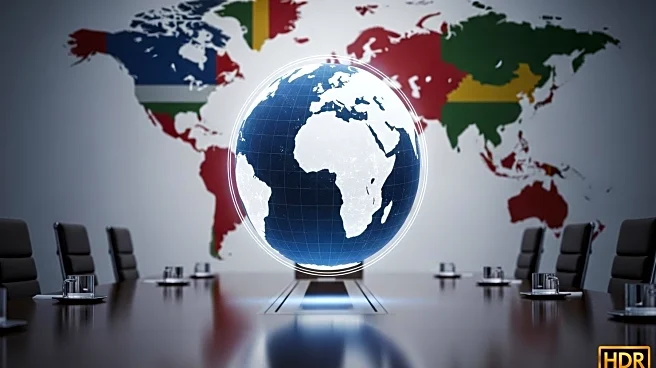What's Happening?
China is hosting a significant security summit in Tianjin, bringing together over 20 leaders, including Prime Minister Narendra Modi of India and President Vladimir Putin of Russia. The summit, organized by the Shanghai Cooperation Organization, marks the largest gathering in the organization's history. The presence of leaders from countries traditionally aligned with the U.S., such as Turkey and Egypt, highlights a changing geopolitical landscape. According to David Pierson, reporting from Tianjin, China is using this summit to signal to Washington that it is no longer the sole global power broker. The Trump administration's foreign policy decisions, including recent tariff increases affecting India, have created opportunities for China to strengthen ties with these nations.
Why It's Important?
The summit underscores a potential shift in global alliances, with China positioning itself as a central figure in international diplomacy. This development could have significant implications for U.S. foreign policy and its traditional alliances. As China seeks to draw countries away from U.S. influence, it may alter the balance of power in international relations, affecting trade, security, and diplomatic strategies. Countries like India, facing economic pressures from U.S. tariffs, may explore alternative partnerships, potentially weakening U.S. influence in the region. This realignment could impact global economic and security frameworks, challenging the U.S.'s ability to maintain its leadership role.
What's Next?
The outcomes of the summit may lead to increased diplomatic engagements between China and participating countries, potentially resulting in new economic and security agreements. The U.S. may need to reassess its foreign policy strategies to counter China's growing influence and address the concerns of its traditional allies. Political leaders and policymakers in Washington might consider diplomatic initiatives to reinforce alliances and mitigate the impact of China's outreach. The evolving geopolitical dynamics could prompt discussions on international cooperation and competition, influencing future global policy directions.
Beyond the Headlines
The summit reflects broader trends in global politics, where non-Western countries are seeking greater autonomy and influence. This shift may lead to a more multipolar world, with diverse centers of power challenging the traditional Western-dominated order. Ethical considerations arise regarding the balance of power and the role of emerging economies in shaping global governance. Long-term implications include potential changes in international norms and the redefinition of strategic partnerships, influencing global stability and cooperation.









